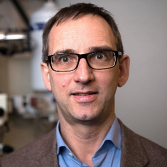当前位置 :首页>新闻动态
Thermo-iono-electronic materials: Functional oxides in gas separation and energy harvesting
Time: March 21th(Thursday), 16:30-18:30
Venue: Room 202, Taizhou Building
Host: Prof.Wangfei
Speaker: Feldhoff.Armin

Bio:
Armin received his diploma in physics from the University of Münster (Germany) and received his PhD degree from the Martin-Luther University Halle-Wittenberg (Germany). He has worked at the Max Planck Institute of Microstructure Physics in Halle (Germany), Cornell University in Ithaca (NY, USA) and at the Centre d’Études de Chimie Métallurgique of the CNRS in Vitry sur Seine (France). He is now the head of the Nanostructure Laboratory at the Institute of Physical Chemistry and Electrochemistry of the Leibniz Universität Hannover (Germany) and holds the venia legendi for Physical Chemistry.
Aim’s research interests are in thermo-iono-electric (TIE) materials for energy conversion. He has published more than 150 papers in peer-reviewed journals. Actually, his h-index is 42 with more than 6,000 citations. He is serving in the editorial team of Electron Microscopy. He is acting as associate editor of both Energy Harvesting & Systems and the Journal of Electronic Materials.
Abstract:
It is proposed to look at energy conversion from the point of view of thermo-ionic-electronic (TIE) materials or systems. In addition to ionic and/or electric charge carriers, entropy is considered as further basic quantity being transported through the material or system if the TIE is simultaneously placed in gradients of temperature and electrochemical potential (ionic and/or electronic). In the basic transport equation, the TIE appears as tensor, which is a major advantage over the concept of the so-called thermodynamics of irreversible processes. The role of energy and its conversion is easily understood. Analogies between the Soret coefficient (thermo-ionic), the Seebeck coefficient (thermo-electric) and the ionic transfer number (ionic-electronic) become evident. Also the thermoelectric (TE) coupling is considered to some detail with a focus on energy harvesting. Lecture will provide a theoretical framework and exemplary experimental results.